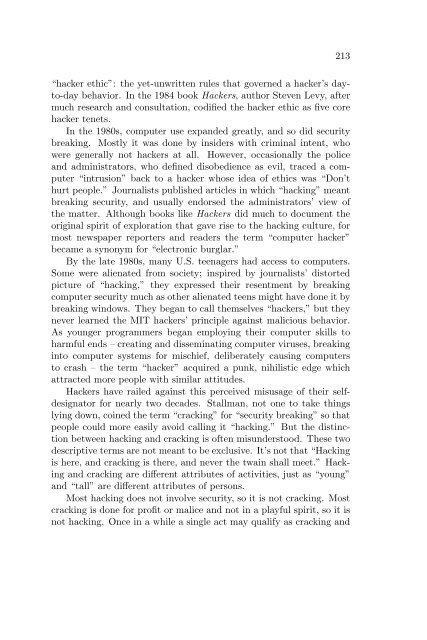Create successful ePaper yourself
Turn your PDF publications into a flip-book with our unique Google optimized e-Paper software.
213<br />
“hacker ethic”: the yet-unwritten rules that governed a hacker’s dayto-day<br />
behavior. In the 1984 book Hackers, author Steven Levy, after<br />
much research and consultation, codified the hacker ethic as five core<br />
hacker tenets.<br />
In the 1980s, computer use expanded greatly, and so did security<br />
breaking. Mostly it was done by insiders with criminal intent, who<br />
were generally not hackers at all. However, occasionally the police<br />
and administrators, who defined disobedience as evil, traced a computer<br />
“intrusion” back to a hacker whose idea of ethics was “Don’t<br />
hurt people.” Journalists published articles in which “hacking” meant<br />
breaking security, and usually endorsed the administrators’ view of<br />
the matter. Although books like Hackers did much to document the<br />
original spirit of exploration that gave rise to the hacking culture, for<br />
most newspaper reporters and readers the term “computer hacker”<br />
became a synonym for “electronic burglar.”<br />
By the late 1980s, many U.S. teenagers had access to computers.<br />
Some were alienated from society; inspired by journalists’ distorted<br />
picture of “hacking,” they expressed their resentment by breaking<br />
computer security much as other alienated teens might have done it by<br />
breaking windows. They began to call themselves “hackers,” but they<br />
never learned the MIT hackers’ principle against malicious behavior.<br />
As younger programmers began employing their computer skills to<br />
harmful ends – creating and disseminating computer viruses, breaking<br />
into computer systems for mischief, deliberately causing computers<br />
to crash – the term “hacker” acquired a punk, nihilistic edge which<br />
attracted more people with similar attitudes.<br />
Hackers have railed against this perceived misusage of their selfdesignator<br />
for nearly two decades. Stallman, not one to take things<br />
lying down, coined the term “cracking” for “security breaking” so that<br />
people could more easily avoid calling it “hacking.” But the distinction<br />
between hacking and cracking is often misunderstood. These two<br />
descriptive terms are not meant to be exclusive. It’s not that “Hacking<br />
is here, and cracking is there, and never the twain shall meet.” Hacking<br />
and cracking are different attributes of activities, just as “young”<br />
and “tall” are different attributes of persons.<br />
Most hacking does not involve security, so it is not cracking. Most<br />
cracking is done for profit or malice and not in a playful spirit, so it is<br />
not hacking. Once in a while a single act may qualify as cracking and


